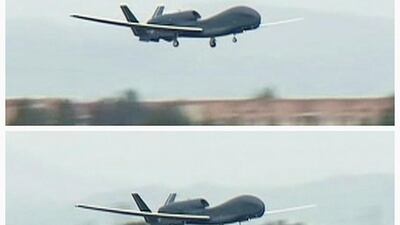US officials and regional allies were on Thursday considering a response to an Iranian missile strike that brought down a US Navy drone over the Strait of Hormuz.
Iran shot down the US drone above the shipping lanes leading to Hormuz, just hours after Tehran’s Houthi proxies in Yemen conducted a cross-border attack on a desalination plant in Saudi Arabia.
Attacks on water supply constitute an act of war under international law.
Adel Al Jubeir, the Saudi Minister of State for Foreign Affairs, warned that a response was being considered over Iran’s actions, and Tehran would not be allowed to close the vital transit corridor.
“We are consulting and looking at various options," Mr Al Jubeir said. "There will be a price they have to pay.
"What we have seen in the past few months is an increase in Iran's mischievous behaviour. Freedom of navigation is essential to the global economy.
"The idea of closing the Strait of Hormuz is going to generate a very, very strong reaction. I think the situation is very grave because of the aggressive behaviour of Iran.
“When you interfere with international shipping it has an impact on the supply of energy and it has an impact on the price of oil which has an impact on the world economy. It essentially affects almost every person on the globe.”
President Donald Trump tweeted that Iran “had made a very big mistake” early Thursday as advisers huddled over how the US could intervene to stop the attacks.
They have included sabotage of oil tankers in the area, missile strikes from Yemen and rockets aimed at Iraq.
Lindsey Graham, a Republican senator close to Mr Trump, said the president believed the situation was “getting into a bad space” but was he determined not to make a deal with Iran just to ease tension.
A meeting at the White House on Thursday included National Security Adviser John Bolton, Secretary of State Mike Pompeo, departing acting defence secretary Patrick Shanahan and his successor Mark Esper, and US Joint Chief of Staff Gen Joseph Dunford.
Mr Trump then met Mr Pompeo, Mr Shanahan and Mr Bolton in the White House.
Mr Bolton was travelling to Israel to discuss current escalation, AFP reported. Congress leaders were also briefed on the escalation this morning.
The US administration is studying options to respond to the drone attack, including attacks on Iranian surface-to-air missile sites to show resolve without triggering a larger conflict.
Mr Al Jubeir said there was clear evidence that Iran was behind an increasing number attacks in recent weeks.
Because the threat had global effects, he welcomed efforts to avoid a war.
The US military's Central Command said the drone, an RQ-4 Global Hawk, was shot down in international airspace in an "unprovoked attack".
The drone was hit at 3.35am UAE time, Centcom spokesman Capt Bill Urban said.
"Iranian reports that the aircraft was over Iran are false," Capt Urban said. "This was an unprovoked attack on a US surveillance asset in international airspace."
The Islamic Revolutionary Guard Corps said it brought the drone down over Iranian territory after it breached Iranian airspace.
It crashed into Iran's southern coastal province of Hormozgan, Iranian Press TV reported.
The Guard claimed the attack was carried out to deter US aggression against Tehran.
"The downing of the American drone was a clear message to America that our borders are Iran's red line and we will react strongly against any aggression," Commander-in-Chief Hossein Salami said.
"Iran is not seeking war with any country but we are fully prepared to defend Iran."
America faces an additional complication in that European states have not united behind the visual evidence the US presented of Iranian involvement in the attacks.
A leading US ambassador in Europe said the EU was too absorbed to its support for the 2015 nuclear deal with Tehran, from which Washington withdrew last year, to see the real danger.
Gordon Sondland, the ambassador to the EU, said the European stance was strengthening Iran.
“How many ships need be blown up before the world acknowledges that Iran was responsible?” Mr Sondland asked.
“What is not productive is this rhetoric going back and forth, particularly in some of the news media, where despite the existence of clear video showing ships being mined by Iran, there are still questions about who caused that.
"All that does is give Iran a great deal of leeway.”
US Democrats have been more cautious in the assessment of the Iranian actions.
Nancy Pelosi, the Speaker of the House of Representatives, said the country did not want war.
Former vice president Joe Biden, who is campaigning against Mr Trump in 2020 said the US leader should not have abandoned the deal.
"President Trump's Iran strategy is a self-inflicted disaster," Mr Biden said. "By walking away from diplomacy, Trump has made military conflict more likely."


